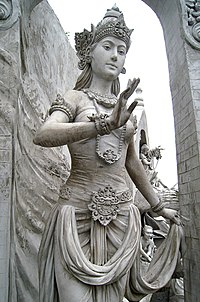Prithvi
| Prithvi | |
|---|---|
Goddess of the Land The Mother Earth | |
| Devanagari | पृथ्वी |
| Sanskrit transliteration | Prithvi |
| Affiliation | Devi, Bhudevi, Pancha Bhoota |
| Abode | Dyuloka |
| Planet | Earth |
| Mantra | Om Bhumhaya Namah |
| Mount | Cow, Elephant |
| Consort | Dyaus Pita |
| Equivalents | |
| Greek equivalent | Gaia |
| Roman equivalent | Tellus Mater |
| Norse equivalent | Jörð |
Template:Classic element Prithvi or Prithvi Mata (Sanskrit: पृथ्वी, IAST (IAST: IAST)
, also पृथिवी,
IAST (IAST: IAST)
) 'the Vast One' is the Sanskrit name for the earth as well as the name of a devi (goddess) in Hinduism and some branches of Buddhism. In the Vedas, she is the consort of Dyaus Pita but, later in Puranas, she is known as Bhūmi, Varaha's wife.
As Pṛthvī Mātā ('Mother Earth') she is complementary to Dyaus Pita ('Father Sky').[1] In the Rigveda, Earth and Sky are primarily addressed in the dual as Dyavapṛthivi.[2] She is associated with the cow. Prithu, an incarnation of Viṣṇu, milked her in cow's form.
Despite strong historical Hindu influence, the name is also used for national personifications of country Indonesia, where in certain points have been internally referred to as "Ibu Pertiwi" (in Indonesian).
In Buddhism[edit]
In Buddhist texts and visual representations, Pṛthvī is described as both protecting Gautama Buddha and as being his witness for his enlightenment. Prithvi appears in Early Buddhism in the Pāli Canon, dispelling the temptation figure Mara by attesting to Gautama Buddha's worthiness to attain enlightenment.[3] The Buddha is frequently depicted performing the bhūmisparśa or "earth-touching" mudrā as a symbolic invocation of the goddess. [4]
In Chinese Buddhism, she is considered one of the Twenty-Four Protective Deities (二十四諸天 Èrshísì zhūtiān) and is usually enshrined in the Mahavira Hall of Buddhist temples along with the other devas.
Pṛthvī Sūkta[edit]
The IAST (IAST: IAST)
(or
IAST (IAST: IAST)
) is a hymn of the Atharvaveda (12.1).
Epithets[edit]

| Category | Transliteration | Gloss |
|---|---|---|
| Provider | Bhūmi | Soil |
| Dhatri | Nursing Mother | |
| Dharitri | Nurturer | |
| Janitra | Birthplace | |
| Medini | Nurturer | |
| Prshni | Mother of Plants | |
| Vanaspatinam Grbhir Osadhinam | Womb of Forest Trees and Herbs | |
| Vishvadhaya | All-Nourishing | |
| Vishvagarbha | World's Womb | |
| Vishvamshu | Producer of Everything | |
| Vishvasvam | Source of Everything | |
| Sustainer | Dhar | Upholder |
| Drdha | Steady One | |
| Ksama | Patient One | |
| Sthavara | Stable One | |
| Vishdava | All-Preserving | |
| Vishvadharini | All-Supporting | |
| Vishvamhara | All-Bearing | |
| Enricher | Ratnagarbha | Repository of Gems |
| Ratnavati | Abounding in Jewels | |
| Vasundhara | Bearer of Treasure |
See also[edit]
References[edit]
- ↑ Leeming, David; Fee, Christopher (2016). The Goddess: Myths of the Great Mother. Reaktion Books. ISBN 978-1-78023-538-7.
- ↑ Doniger O'Flaherty 2007, p. 201, 330.
- ↑ Shaw 2006, p. 27.
- ↑ Shaw 2007, p. 17.
- Doniger O'Flaherty, Wendy, ed. (2007). The Rig Veda: An Anthology: One Hundred and Eight Hymns. Harmondsworth: Penguin Books. ISBN 9780140449891.
- Shaw, Miranda Eberle (2006). Buddhist Goddesses of India. Princeton University Press. pp. 27. ISBN 978-0-691-12758-3.
Further reading[edit]
- Dictionary of Hindu Lore and Legend (ISBN 0-500-51088-1) by Anna Dallapiccola
- Hindu Goddesses: Vision of the Divine Feminine in the Hindu Religious Traditions (ISBN 81-208-0379-5) by David Kinsley
